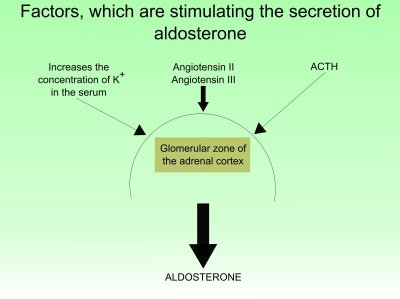Nelson Vergel
Founder, ExcelMale.com
A frequent cause of high blood pressure and water retention is when levels of certain hormones in the body are unbalanced or functioning poorly. The hormones that are frequently at fault are secreted by the kidneys and the pituitary or adrenal glands. They are called aldosterone, ACTH, and renin

What is aldosterone?
Aldosterone (ALD) is one of a group of connected hormones. They form the renin–angiotensin–aldosterone system (1); this system is activated when there is a decrease in blood flow to your kidneys following a drop in blood volume or blood pressure such as during heavy bleeding, or sodium levels fall below healthy levels (1).
Aldosterone is a mineralocorticoid, which means that it adjusts the mineral levels in our cells, particularly sodium and potassium (2). It regulates both fluid levels and blood pressure in the body. Stress is a factor that can increase the release of aldosterone and cause sodium levels to rise. Regardless why, an increase in aldosterone results in edema (water retention) and high blood pressure (3).
Someone experiencing high aldosterone levels may also experience (4):
The Aldosterone test is frequently used to diagnose both fluid and electrolyte disorders (5) that may be caused by: Click here

What is aldosterone?
Aldosterone (ALD) is one of a group of connected hormones. They form the renin–angiotensin–aldosterone system (1); this system is activated when there is a decrease in blood flow to your kidneys following a drop in blood volume or blood pressure such as during heavy bleeding, or sodium levels fall below healthy levels (1).
Aldosterone is a mineralocorticoid, which means that it adjusts the mineral levels in our cells, particularly sodium and potassium (2). It regulates both fluid levels and blood pressure in the body. Stress is a factor that can increase the release of aldosterone and cause sodium levels to rise. Regardless why, an increase in aldosterone results in edema (water retention) and high blood pressure (3).
Someone experiencing high aldosterone levels may also experience (4):
- Low potassium levels (causing muscle cramps)
- Abnormally increased blood volume
- Unusually alkaline blood (because aldosterone promotes acid secretion)
The Aldosterone test is frequently used to diagnose both fluid and electrolyte disorders (5) that may be caused by: Click here
















